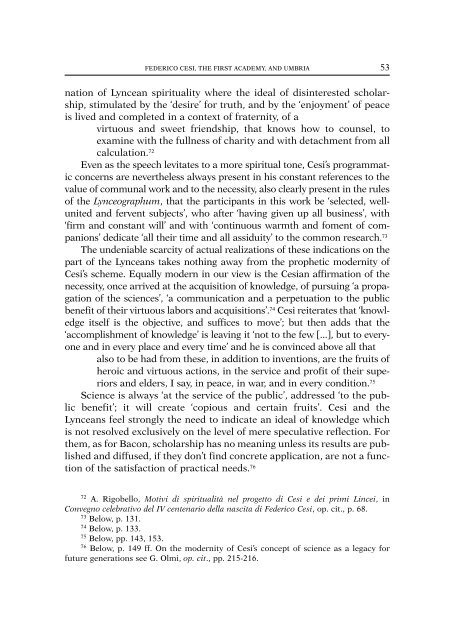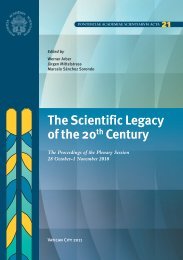FEDERICO CESI, THE FIRST ACADEMY, AND UMBRIA 53nation <strong>of</strong> Lyncean spirituality where the ideal <strong>of</strong> <strong>di</strong>sinterested scholarship,stimulated by the ‘desire’ for truth, and by the ‘enjoyment’ <strong>of</strong> peaceis lived and completed in a context <strong>of</strong> fraternity, <strong>of</strong> avirtuous and sweet friendship, that knows how to counsel, toexamine with the fullness <strong>of</strong> charity and with detachment from allcalculation. 72Even as the speech levitates to a more spiritual tone, Cesi’s programmaticconcerns are nevertheless always present in his constant references to thevalue <strong>of</strong> communal work and to the necessity, also clearly present in the rules<strong>of</strong> the Lynceographum, that the participants in this work be ‘selected, wellunitedand fervent subjects’, who after ‘having given up all business’, with‘firm and constant will’ and with ‘continuous warmth and foment <strong>of</strong> companions’de<strong>di</strong>cate ‘all their time and all assiduity’ to the common research. 73The undeniable scarcity <strong>of</strong> actual realizations <strong>of</strong> these in<strong>di</strong>cations on thepart <strong>of</strong> the Lynceans takes nothing away from the prophetic modernity <strong>of</strong>Cesi’s scheme. Equally modern in our view is the Cesian affirmation <strong>of</strong> thenecessity, once arrived at the acquisition <strong>of</strong> knowledge, <strong>of</strong> pursuing ‘a propagation<strong>of</strong> the sciences’, ‘a communication and a perpetuation to the publicbenefit <strong>of</strong> their virtuous labors and acquisitions’. 74 Cesi reiterates that ‘knowledgeitself is the objective, and suffices to move’; but then adds that the‘accomplishment <strong>of</strong> knowledge’ is leaving it ‘not to the few [...], but to everyoneand in every place and every time’ and he is convinced above all thatalso to be had from these, in ad<strong>di</strong>tion to inventions, are the fruits <strong>of</strong>heroic and virtuous actions, in the service and pr<strong>of</strong>it <strong>of</strong> their superiorsand elders, I say, in peace, in war, and in every con<strong>di</strong>tion. 75Science is always ‘at the service <strong>of</strong> the public’, addressed ‘to the publicbenefit’; it will create ‘copious and certain fruits’. Cesi and theLynceans feel strongly the need to in<strong>di</strong>cate an ideal <strong>of</strong> knowledge whichis not resolved exclusively on the level <strong>of</strong> mere speculative reflection. Forthem, as for Bacon, scholarship has no meaning unless its results are publishedand <strong>di</strong>ffused, if they don’t find concrete application, are not a function<strong>of</strong> the satisfaction <strong>of</strong> practical needs. 7672 A. Rigobello, Motivi <strong>di</strong> spiritualità nel progetto <strong>di</strong> Cesi e dei primi Lincei, inConvegno celebrativo del IV centenario della nascita <strong>di</strong> Federico Cesi, op. cit., p. 68.73 Below, p. 131.74 Below, p. 133.75 Below, pp. 143, 153.76 Below, p. 149 ff. On the modernity <strong>of</strong> Cesi’s concept <strong>of</strong> science as a legacy forfuture generations see G. Olmi, op. cit., pp. 215-216.
54FEDERICO CESI, LA PRIMA ACCADEMIA, L’UMBRIAE se le “fatighe” delle “contemplationi” e delle “sperimentationi” devonoavere dunque un’effettiva “propagatione” e “communicatione”, questocomporta un impegno vincolante <strong>di</strong> <strong>di</strong>ffondere i risultati delle propriericerche e una particolare cura, da parte dell’Accademia stessa, della attivitàe<strong>di</strong>toriale. La pubblicazione “con li propri scritti” delle ricerche è unobbligo previsto dai regolamenti dell’Accademia e “i Lincei il nome, honoree fama hanno d’haverlo e ottenerlo solo con libri e opere”. 77 Questospiega perché Cesi de<strong>di</strong>ca particolare attenzione al problema della pubblicazionedegli scritti dei lincei, al fatto che l’Accademia deve farsi carico<strong>di</strong> tutte le spese <strong>di</strong> stampa allo scopo <strong>di</strong> liberare gli autori <strong>di</strong> ognipreoccupazione <strong>di</strong> or<strong>di</strong>ne materiale. La pubblicazione affidataall’Accademia <strong>di</strong>viene un atto <strong>di</strong> responsabilità collettiva, un obbligo chegarantisce gli stessi autori anche dopo la loro morte. 78 È questo un aspettomoderno e lungimirante della mentalità <strong>di</strong> Cesi dovuta, più che ad unosnobistico compiacimento per le produzioni sue e dei suoi compagni, aduna concezione veramente democratica della cultura.C’è solo da rilevare che, nonostante l’insistenza e la solerzia <strong>di</strong> Cesi suquesto punto e al <strong>di</strong> là delle pubblicazioni galileiane delle Macchie solarie del Saggiatore, nonostante l’impresa del Tesoro messicano (1651), i risultaticoncreti <strong>di</strong> questo progetto furono alquanto deludenti. 79 C’è daaggiungere però tra le idee più nuove e più originali <strong>di</strong> Cesi vi era quella<strong>di</strong> pubblicare un “volume epistolico delle novità celesti” 80 che avrebbedovuto raccogliere le lettere più scientificamente rilevanti della corrispondenzalincea. Quella <strong>di</strong> privilegiare, accanto alla stampa delle opere,la corrispondenza risponde alla necessità <strong>di</strong> collaborazione sulla quale sifonda la stessa accademia, e cioè quella <strong>di</strong> istituire un tipo <strong>di</strong> informazionesempre continua e cadenzata nel tempo, <strong>di</strong> non lasciare i compagni“<strong>di</strong>suniti, sparsi, ascosti e senz’alcuna corrispondenza, guida e consiglio”.81 La ben “regolata corrispondenza” dovrà garantire soprattutto,oltre che l’occasione <strong>di</strong> un contatto aperto con stu<strong>di</strong>osi anche stranieri, la“bella unione” dell’Accademia, costruita sui “mutui aiuti e consegli”,77 Federico Cesi a Francesco Stelluti, metà aprile 1513, in Carteggio, p. 350.78 Infra, pp. 134-136.79 J.-M. Gardair, op. cit., pp. 175-176.80 Federico Cesi a Giovanni Faber, 7 luglio 1612, in Carteggio, p. 249.81 Infra, p. 136.
- Page 1 and 2:
THE PONTIFICALACADEMY OFSCIENCESExt
- Page 3 and 4: Address:The Pontifical Academy of S
- Page 5 and 6: ISBN 88-7761-083-2© Copyright 2003
- Page 7 and 8: Quest’edizione del Proponimento e
- Page 9 and 10: FEDERICO CESI, LA PRIMA ACCADEMIA,
- Page 11 and 12: 10FEDERICO CESI, LA PRIMA ACCADEMIA
- Page 13 and 14: 12FEDERICO CESI, LA PRIMA ACCADEMIA
- Page 15 and 16: 14FEDERICO CESI, LA PRIMA ACCADEMIA
- Page 17 and 18: 16FEDERICO CESI, LA PRIMA ACCADEMIA
- Page 19 and 20: 18FEDERICO CESI, LA PRIMA ACCADEMIA
- Page 21 and 22: 20FEDERICO CESI, LA PRIMA ACCADEMIA
- Page 23 and 24: 22FEDERICO CESI, LA PRIMA ACCADEMIA
- Page 25 and 26: 24FEDERICO CESI, LA PRIMA ACCADEMIA
- Page 27 and 28: 26FEDERICO CESI, LA PRIMA ACCADEMIA
- Page 29 and 30: 28FEDERICO CESI, LA PRIMA ACCADEMIA
- Page 31 and 32: 30FEDERICO CESI, LA PRIMA ACCADEMIA
- Page 33 and 34: 32FEDERICO CESI, LA PRIMA ACCADEMIA
- Page 35 and 36: 34FEDERICO CESI, LA PRIMA ACCADEMIA
- Page 37 and 38: 36FEDERICO CESI, LA PRIMA ACCADEMIA
- Page 39 and 40: 38FEDERICO CESI, LA PRIMA ACCADEMIA
- Page 41 and 42: 40FEDERICO CESI, LA PRIMA ACCADEMIA
- Page 43 and 44: 42FEDERICO CESI, LA PRIMA ACCADEMIA
- Page 45 and 46: 44FEDERICO CESI, LA PRIMA ACCADEMIA
- Page 47 and 48: 46FEDERICO CESI, LA PRIMA ACCADEMIA
- Page 49 and 50: 48FEDERICO CESI, LA PRIMA ACCADEMIA
- Page 51 and 52: 50FEDERICO CESI, LA PRIMA ACCADEMIA
- Page 53: 52FEDERICO CESI, LA PRIMA ACCADEMIA
- Page 57 and 58: 56FEDERICO CESI, LA PRIMA ACCADEMIA
- Page 59 and 60: 58FEDERICO CESI, LA PRIMA ACCADEMIA
- Page 61 and 62: 60FEDERICO CESI, LA PRIMA ACCADEMIA
- Page 63 and 64: 62FEDERICO CESI, LA PRIMA ACCADEMIA
- Page 65 and 66: 64FEDERICO CESI, LA PRIMA ACCADEMIA
- Page 67 and 68: 66FEDERICO CESI, LA PRIMA ACCADEMIA
- Page 69 and 70: 68FEDERICO CESI, LA PRIMA ACCADEMIA
- Page 72 and 73: FEDERICO CESI, THE FIRST ACADEMY, A
- Page 74 and 75: FEDERICO CESI, THE FIRST ACADEMY, A
- Page 76 and 77: FEDERICO CESI, THE FIRST ACADEMY, A
- Page 78 and 79: FEDERICO CESI, THE FIRST ACADEMY, A
- Page 80 and 81: FEDERICO CESI, THE FIRST ACADEMY, A
- Page 82 and 83: FEDERICO CESI, THE FIRST ACADEMY, A
- Page 84 and 85: FEDERICO CESI, THE FIRST ACADEMY, A
- Page 86 and 87: FEDERICO CESI, THE FIRST ACADEMY, A
- Page 88 and 89: BIOGRAPHICAL NOTEFederico Cesi (158
- Page 90 and 91: LYNCEAN RESOLUTION 1That precept, s
- Page 92 and 93: CONDENSED LYNCEAN CONSTITUTIONS 1So
- Page 94 and 95: CONDENSED LYNCEAN CONSTITUTIONS 93h
- Page 96 and 97: CONDENSED LYNCEAN CONSTITUTIONS 95I
- Page 98 and 99: CONDENSED LYNCEAN CONSTITUTIONS 97I
- Page 100 and 101: ON THE NATURAL DESIRE FOR KNOWLEDGE
- Page 102 and 103: ON THE NATURAL DESIRE FOR KNOWLEDGE
- Page 104 and 105:
ON THE NATURAL DESIRE FOR KNOWLEDGE
- Page 106 and 107:
ON THE NATURAL DESIRE FOR KNOWLEDGE
- Page 108 and 109:
ON THE NATURAL DESIRE FOR KNOWLEDGE
- Page 110 and 111:
ON THE NATURAL DESIRE FOR KNOWLEDGE
- Page 112 and 113:
ON THE NATURAL DESIRE FOR KNOWLEDGE
- Page 114 and 115:
ON THE NATURAL DESIRE FOR KNOWLEDGE
- Page 116 and 117:
ON THE NATURAL DESIRE FOR KNOWLEDGE
- Page 118 and 119:
ON THE NATURAL DESIRE FOR KNOWLEDGE
- Page 120 and 121:
ON THE NATURAL DESIRE FOR KNOWLEDGE
- Page 122 and 123:
ON THE NATURAL DESIRE FOR KNOWLEDGE
- Page 124 and 125:
ON THE NATURAL DESIRE FOR KNOWLEDGE
- Page 126 and 127:
ON THE NATURAL DESIRE FOR KNOWLEDGE
- Page 128 and 129:
ON THE NATURAL DESIRE FOR KNOWLEDGE
- Page 130 and 131:
ON THE NATURAL DESIRE FOR KNOWLEDGE
- Page 132 and 133:
ON THE NATURAL DESIRE FOR KNOWLEDGE
- Page 134 and 135:
ON THE NATURAL DESIRE FOR KNOWLEDGE
- Page 136 and 137:
ON THE NATURAL DESIRE FOR KNOWLEDGE
- Page 138 and 139:
ON THE NATURAL DESIRE FOR KNOWLEDGE
- Page 140 and 141:
ON THE NATURAL DESIRE FOR KNOWLEDGE
- Page 142 and 143:
ON THE NATURAL DESIRE FOR KNOWLEDGE
- Page 144 and 145:
ON THE NATURAL DESIRE FOR KNOWLEDGE
- Page 146 and 147:
ON THE NATURAL DESIRE FOR KNOWLEDGE
- Page 148 and 149:
ON THE NATURAL DESIRE FOR KNOWLEDGE
- Page 150 and 151:
ON THE NATURAL DESIRE FOR KNOWLEDGE
- Page 152 and 153:
ON THE NATURAL DESIRE FOR KNOWLEDGE
- Page 154 and 155:
ON THE NATURAL DESIRE FOR KNOWLEDGE
- Page 156 and 157:
ON THE NATURAL DESIRE FOR KNOWLEDGE
- Page 158:
ON THE NATURAL DESIRE FOR KNOWLEDGE
















